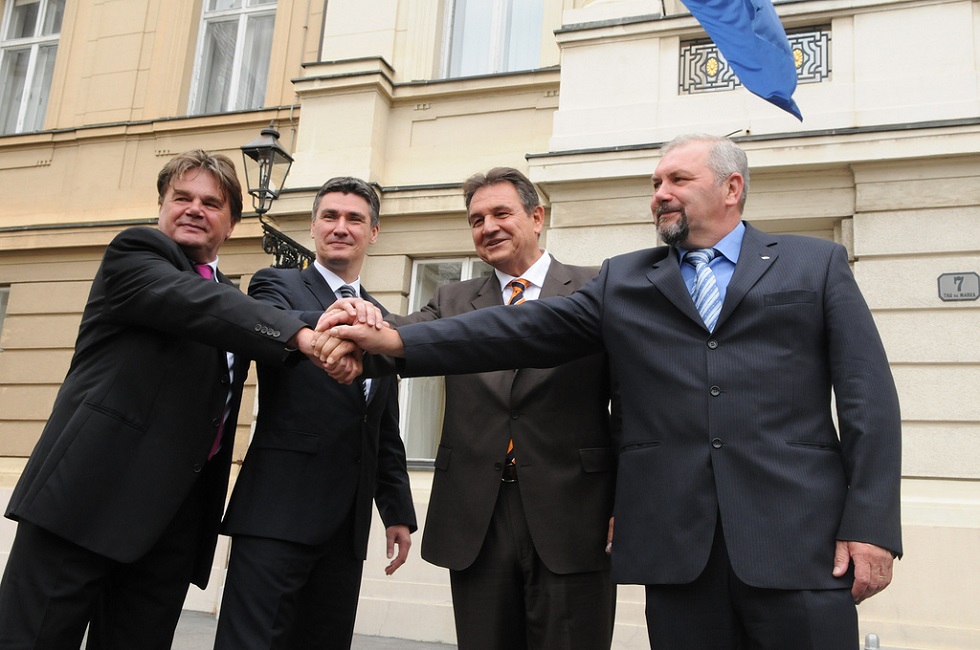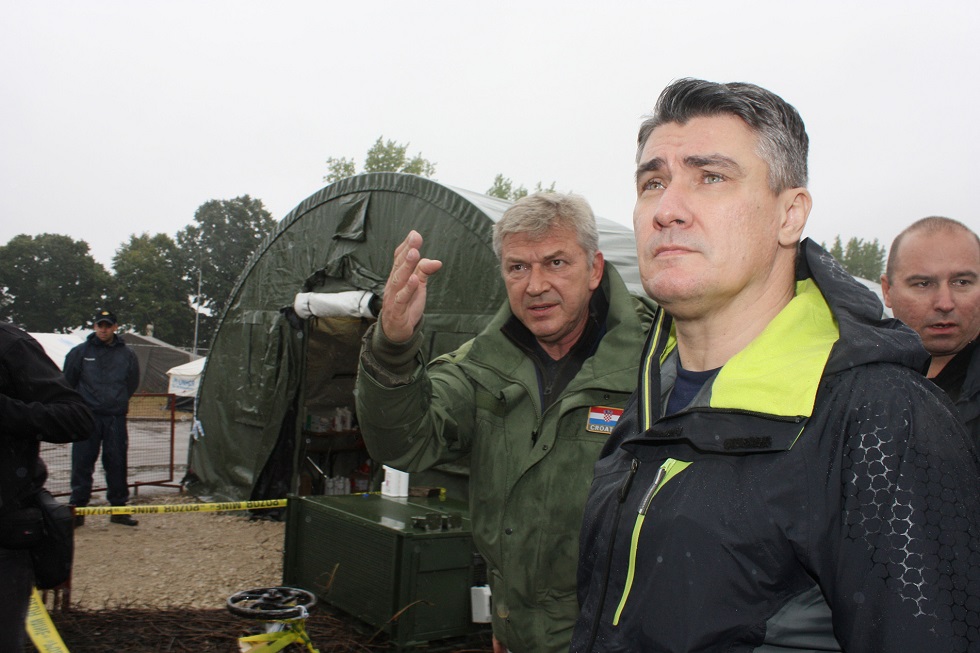Although only 53 years old, Croatian President-elect Zoran Milanović is already a political veteran. Since Croatia's independence, he is the only politician to be elected to two of the most important state functions, first as prime minister and now president.
He was born on October 30, 1966 in Zagreb. In private conversations, he likes to point out that Zagreb shaped his identity, but was also intrigued by his family history, according to Robert Bajruš/Jutarnji List on January 6, 2020. Therefore, Milanović researched archives from Austrian barracks and the Sinj monastery in a quest for information on his ancestors and their life paths. Zoran Milanović's family is from western Bosnia and arrived in the Sinj region as part of a mass migration led by Franciscan Friars in 1687. His mother Đurđica Matasić's family has lived in Sinj for almost two centuries.
Father Held Key Zagreb Government Positions
His father, Stipe Milanović, performed several important roles during the socialist regime: he was Cabinet Secretary to Miko Tripalo, a Zagreb city council member and chaired the Vatroslav Lisinski Hall Construction Committee. In the early 1990s, he joined HDZ (Croatian Democratic Union) and became Assistant Minister to Vlatko Pavletić.
Milanović's claim that his grandfather was an Ustasha member (Croatian WWII Fascists) was one of the more interesting developments in the 2016 election campaign. He was referring to his mother Đurđica’s stepfather, Petar Plišić, but had kept silent about him until then.
He graduated from the Faculty of Law in Zagreb in the early 1990s where he was an excellent student. He received the Rector's Award and participated in the "Telders" competition in public international law at The Hague.
Began Post Law School Career in Foreign Diplomacy
Milanović landed his first job at the Commercial Court in Zagreb and then the Ministry of Foreign Affairs in 1993, where he arrived upon the recommendation of Ivan Šimonović, professor at the Faculty of Law and Permanent Representative of the Republic of Croatia to the UN. He became advisor to the Croatian Mission to the European Union and NATO in Brussels in 1996 and completed a postgraduate certificate in European Union law there two years later.
He joined SDP (Social Democratic Party of Croatia) immediately after his return to Zagreb in 1999. After SDP won the January 3, 2000 elections as part of a coalition, he was entrusted with a position in communications with NATO. Three years later, he was appointed Assistant Minister of Foreign Affairs under Tonino Picula. However, he left diplomacy and was brought onto the SDP Executive Board at the invitation of Ivica Račan after the HDZ won the 2003 elections.
Assumed SDP Leadership Role After Račan
The SDP party membership overwhelmingly chose Milanović as their new leader when Ivica Račan died in 2007. He had defeated Željko Antunović, Milan Bandić and Tonino Picula; the party’s old guard. While Račan had not considered him his successor; within a month Milanović had taken control of SDP and set about overthrowing Ivo Sanader.
Diana Pleština, widow of the former SDP leader, spoke about the Račan-Milanović relationship. While she has always thought well of Milanović; she also noted:
"Ivica Račan understood that Milanović was young and well-educated, and had experience communicating with the outside world, but he was not referring to Zoran Milanović in the phrase 'New SDP Force'. Instead he was referring to Milanović along with other members of the party. Therefore, the ‘New SDP force’ was not referring to one person, but an overall proposal to continue the rejuvenation of the Social Democratic Party, and one of those players was Milanović,” Dijana Pleština recalled.
However, he lost to Ivo Sanader in the 2007 parliamentary elections and spent the next four years leading the opposition. During that time, he was able to marginalize the old guard within SDP and surround himself with a new generation of associates including Ranko Ostojić, Siniša Hajdaš Dončić, Rajko Ostojić, Ante Kotromanović, Igor Dragovan and Gordan Maras.

Defeated Scandal Ridden HDZ With Kukuriku Coalition
In November 2011, under Milanović’s leadership, the SDP-HNS-IDS-HSU coalition overwhelmingly defeated HDZ, which had been rocked by a series of corruption scandals. Their coalition ruled Croatia for the next four years. Before that victory, Milanović played a crucial role in the election of SDP presidential candidate Ivo Josipović. Josipović's victory had a strategic effect on the downfall of HDZ and Prime Minister Jadranka Kosor, and subsequent victory of the four-party coalition.
Milanović's political experience did not often reveal itself during his first three years in office. In the face of poor economic performance, he was subject to widespread criticism for refusing to make severe cuts to a bloated and inefficient state administration, which was stifling the economy. In addition, almost nobody believed he could make a comeback after he barely succeeded in expelling Slavko Linić from SDP in June 2014. Those doubts were strengthened after Kolinda Grabar-Kitarović narrowly defeated Ivo Josipović in the 2015 presidential election.
"Who would have thought that we were capable of regaining voter confidence back in January," Milanović recently suggested in a private interview.
Political Personal Evolution and Move to Right
Nevertheless, he changed tremendously and became much more accessible while choosing to remain silent about the confrontation with Linić. Even then, a well-known SDP politician revealed that he had been closely observing Milanović's career for seven years, and denied the widespread belief that the SDP chief was incapable of transforming himself:
"After losing the election to Ivo Sanader in 2007, Milanović realized that he had to change. He succeeded because he strengthened the party with new young talent. I’ve also changed and have begun displaying a better part of my character in interactions with people. That’s why I believe he can also change in a positive way,” claimed this member of government.

Praise for Franjo Tuđman and Croatian Nation in Knin
After all, Milanović's metamorphosis, which manifested itself in a slight turn to the right, was first noticed in Knin on August 5, 2014 when he gave a speech commemorating Dan domovinske zahvalnosti (Homeland Thanksgiving Day), which suggested a more patriotic direction. It was then that he first came forward with the conviction that his government was a people's government elected by the Croatian nation, comprised of people who are of primarily Croatian background. "As long is that is the case, we will oversee this country and lead it on the right path with Croatian interests in mind," Milanović said.
Milanović also paid respect to the first Croatian president, Franjo Tuđman, "because he was the Croatian president during a most difficult and challenging time."
“We have been waiting for a thousand years to have our own state and are grateful to those who gave everything for our country. For thousands of years we have worked, fought and died for foreigners, who treated us like foreigners, but they are not our enemies today. We are united with them in the EU and are building a better future together,” said Milanović in Knin.
It was the beginning of a 16-month campaign in which Zoran Milanović decided to tackle the stigma of (Croatian) leftists and present himself as a self-aware national leader. A social democrat who respects Tuđman, frequently mentions Croatia and condemns chauvinism then became his election-winning formula.
He also hired PR expert Alex Braun and his government achieved positive economic results in 2015. However, Milanović narrowly lost the parliamentary elections, remained at the helm of the SDP and defeated his old rival, Zlatko Komadin, in party elections.
Withdrawal from Politics After 2016 Defeat
After the fall of Prime Minister Tim Orešković’s short-lived administration in late 2016, Milanović led the People's Coalition into the elections, but lost, and then announced that he was withdrawing from politics.
In November 2016, he founded EuroAlba Advisory. Earlier this year, the media reported that the company's total 2018 revenue was 744,970 HRK (99,700 EUR), about a 20 percent increase from a 2017 reported revenue of 625,000 HRK (83,600 EUR).
Milanović lost his father Stipe and his younger brother Krešimir, who died after a short illness, during his election campaign late last year.
Follow our Politics page to stay updated on the new Croatian presidency and upcoming 2020 parliamentary elections.


